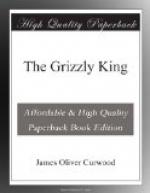This old bear was famished. His claws were gone; his hair was thin, and in some places his skin was naked, and he had barely more than red, hard gums to chew with. If he lived until autumn he would den up—for the last time. Perhaps death would come even sooner than that. If so, Kuyas Wapusk would know in time, and he would crawl off into some hidden cave or deep crevice in the rocks to breathe his last. For in all the Rocky Mountains, so far as Bruce or Langdon knew, there was not a man who had found the bones or body of a grizzly that had died a natural death!
And big, hunted Thor, torn by wound and pursued by man, seemed to understand that this would be the last real feast on earth for Kuyas Wapusk—too old to fish for himself, too old to hunt, too old even to dig out the tender lily roots; and so he let him eat until the last fish was gone, and then went on, with Muskwa tagging at his heels.
CHAPTER TWELVE
For still another two hours Thor led Muskwa on that tiresome jaunt into the north. They had travelled a good twenty miles since leaving the Bighorn Highway, and to the little tan-faced cub those twenty miles were like a journey around the world. Ordinarily he would not have gone that far away from his birthplace until his second year, and very possibly his third.
Not once in this hike down the valley had Thor wasted time on the mountain slopes. He had picked out the easiest trails along the creek. Three or four miles below the pool where they had left the old bear he suddenly changed this procedure by swinging due westward, and a little later they were once more climbing a mountain. They went up a long green slide for a quarter of a mile, and luckily for Muskwa’s legs this brought them to the smooth plainlike floor of a break which took them without much more effort out on the slopes of the other valley. This was the valley in which Thor had killed the black bear twenty miles to the southward.
From the moment Thor looked out over the northern limits of his range a change took possession of him. All at once he lost his eagerness to hurry. For fifteen minutes he stood looking down into the valley, sniffing the air. He descended slowly, and when he reached the green meadows and the creek-bottom he mooshed along straight in the face of the wind, which was coming from the south and west. It did not bring him the scent he wanted—the smell of his mate. Yet an instinct that was more infallible than reason told him that she was near, or should be near. He did not take accident or sickness or the possibility of hunters having killed her into consideration. This was where he had always started in to hunt for her, and sooner or later he had found her. He knew her smell. And he crossed and recrossed the bottoms so that it could not escape him.
When Thor was love-sick he was more or less like a man: that is to say, he was an idiot. The importance of all other things dwindled into nothingness. His habits, which were as fixed as the stars at other times, took a complete vacation. He even forgot hunger, and the whistlers and gophers were quite safe. He was tireless. He rambled during the night as well as the day in quest of his lady-love.




